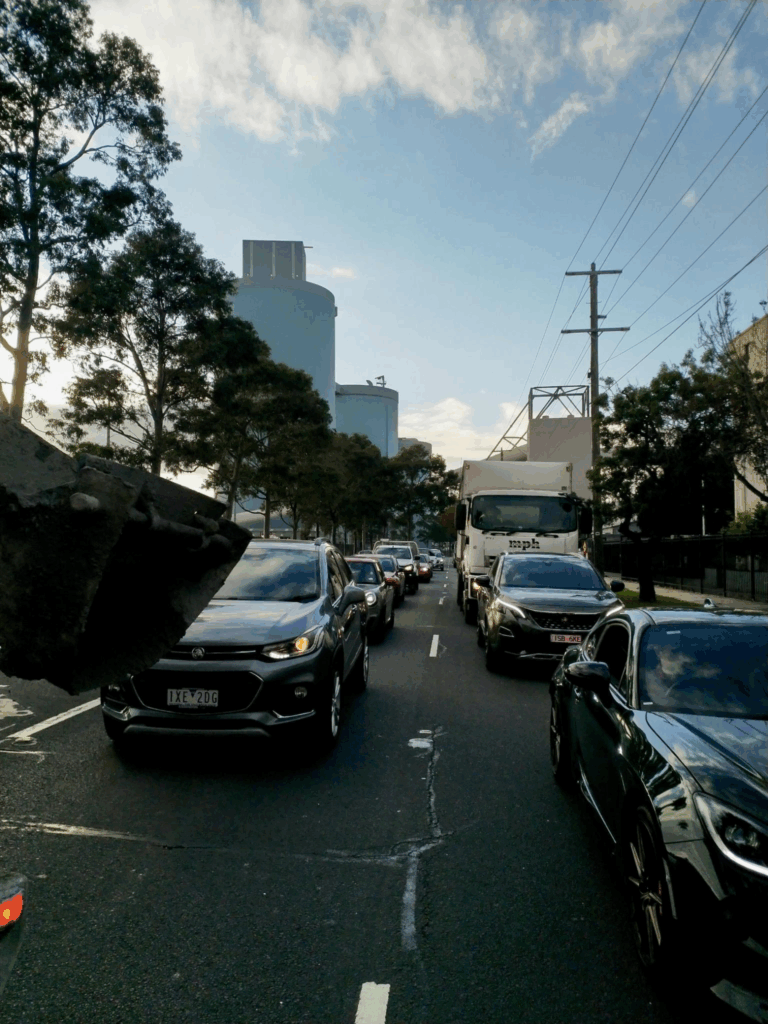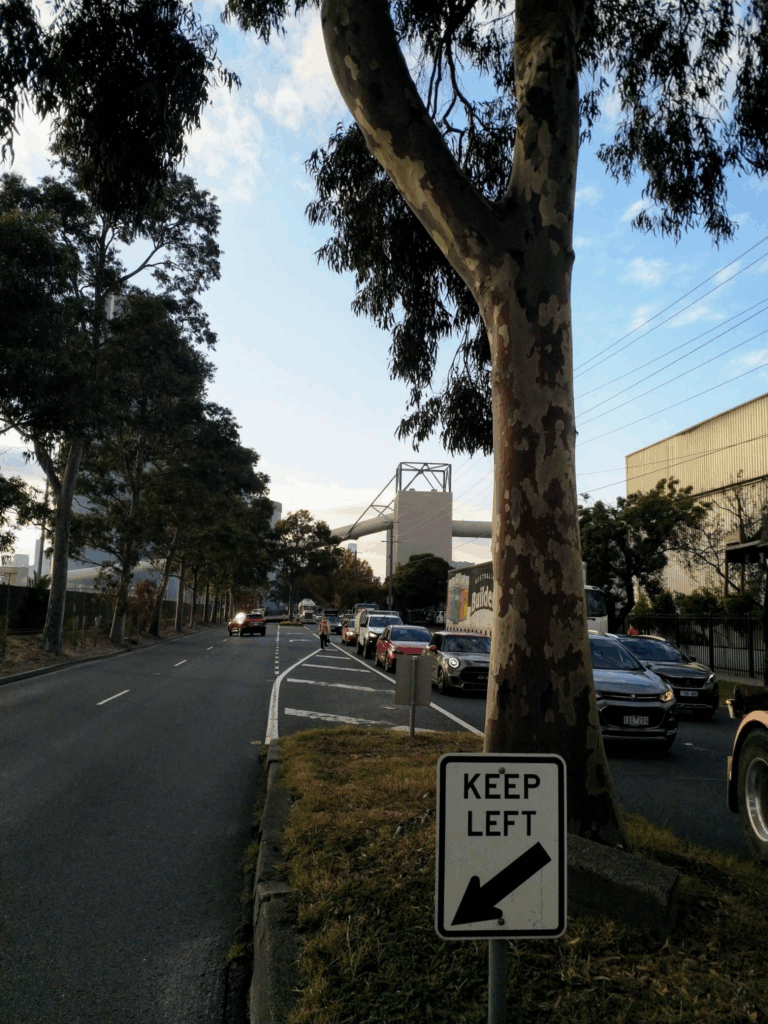
An account of a small disruption at an Elbit office-and its limitations.
On Nakba day 2025, the Zionist entity’s largest arms producer Elbit Systems’ hidden office location was revealed by activist networks at 7am in ‘melbourne’ / Naarm. This began with banner drops from the front of the building reading: “Glory to the Martyrs” and “Elbit Systems: You tried to hide you are committing genocide: Proudly sponsored by Victorian Government”; along with people lighting flares, holding banners and chanting in the courtyard.
Leading up to the event, the vibe set by initiators was not to escalate, but to “expose” Elbit—although there was also some more militant rhetoric. In the pre-action briefing and messaging phrases such as “disrupt”, “targeting a critical juncture of the Israel/Aus arms trade”, and “action” were used alongside “raising awareness” and “talking to workers”.
This mixed messaging is in contrast to the recent call made by the Popular Front for the Liberation of Palestine asking people round the world to “lay siege” to Elbit Systems offices and facilities. While people were chanting in the courtyard in front of the offices some of us decided to try and initiate a little disruption.
The complex had an underground car park with some 600 spaces and two entrances. Seeing that employees were beginning to come through the entrance at the back off of Lorimer street—a key road for logistics in ‘port melbourne’ used by employees, trucks etc.—a few of us gathered outside this entrance. At first people stood at the car park entrance giving out flyers to incoming workers, highlighting what Elbit Systems is, and its role in Palestine.
Some of us wanted to stop workers from coming in, leading to a debate about what was the purpose of this “action”. Some protestors present were initially reluctant to impose a hard picket because it was argued the intent of the organisers was not to disrupt but to raise awareness and that disruption would possibly get the workers, including those who didn’t work for Elbit but for companies who shared the space, “off side.”
In response we said some disruption of other companies in the complex would put more pressure to force Elbit out. We said that there needed to be a cost for Elbit’s office operating here and that meant broader disruption of the complex as a whole. The idea of just blocking Elbit workers and no-one else also wasn’t viable as we had no way to identify them—it wasn’t realistic to expect them to declare themselves.
While this debate was being had—flyers were handed out—a number of employees had driven their way through our soft picket. When asked whether they knew about Elbit Systems and that the company was operating in the complex everyone we heard or spoke to said either that yes, they knew, or expressed no surprise. A few people took flyers, a few got hostile and sounded their horns/ tried to drive through until we let them past.
After a bunch of back and forth on this, it was agreed that if we could gather more people (at this point there were around five of us) we would enforce a hard picket. After some moving back and forth, we gathered around seven people at the car park entrance. At this point the carpark gates had been closed but could be opened by the workers. We placed a sign, some traffic cones and a chain and ourselves in front of the entrance blocking it completely.
We turned a number of the workers turning up away, refusing to let them in even as some sounded their horns and tried to intimidate us by driving towards us. One worker (white guy) said he was “on [our] side” but that we were turning people against us through our disruptive actions. He also said that one of us wasn’t “from here” insinuating they had no right to protest as they did not speak with an “australian” accent. When we said he wasn”t “from here” either as this is Aboriginal land, he got hostile and said “it”s not Aboriginal land, it’s the world’s land!”, then drove away angrily. As he got back in the car, he muttered something like “that’s a slur!”, possibly in reference to the remark about Aboriginal land.
We noted that his comment about being ‘on side’ had been no more than a bad-faith deflection. We also noticed most of the workers trying to enter the carpark were white and drove expensive cars.
Because most people protesting were gathered in the dead-end courtyard in front of the offices on the other side of the complex and away from the main road it meant that there was not a rapid cop mobilisation or response. Security had also been slow to respond, with the car park exit and entry initially being completely open, only being closed after around twenty minutes. But after around ten minutes of blocking the carpark entrance, two cops turned up to monitor the action.
As more cops arrived, they began to show some interest, at first asking if there was a leader they could speak to. None of us responded. They then had a property manager tell us not to enter private property or we’d be arrested for trespass. Then they gave threats to move/arrest us for imposing the blockade at the carpark entrance stating we could picket on the side walk at either side but that we could not block the entrance. We chanted ‘Free Palestine!’ and “Elbit Systems you can’t hide, you’re committing genocide” to ‘Land back, liberation, end colonial occupation!’, while we continued to block cars from entering the complex.
After a few more minutes when the cops looked like they were going to make a move on us, we defied them further by moving the blockade from the carpark entrance and instead took the road directly in front of it, blocking traffic as well as any more incoming employees. By this point more people had left the action at the other side of the complex to join us, with around twenty of us on the road and in front of the carpark entrance now, people also brought hazard tape and cris-crossed it between the fence, the cones and the sandwich board that had been placed in in the driveway.
For close to half an hour we stopped traffic on half of Lorimer St, a key freight road for logistical transportation and capital circulation in ‘port melbourne’. We also continued our hard picket, preventing any entry into the car park, despite some cars trying to drive through some of us. A concrete slab was also manoeuvred onto the road and cops had to stop another barricade from a nearby site from being placed into the middle of the road by protestors.
We continued to chant and a Palestine flag was held in front of the stopped traffic. After this time, police backup began to arrive and cop numbers were approaching our own. The ‘evidence gathering team’ also arrived on scene and began to film us. Not knowing if we were going to get any more support from others to carry on the action and weighing up the risks that were posed by the cops, we quickly dispersed in different directions, having blocked the entry to the carpark for maybe one hour or slightly less in total.
Despite having achieved a temporary car park entrance block, it was in all a very small disruption, with many of us having a sense of the morning being a missed opportunity. To provide some context to the action, just after October 7th 2023 the Elbit offices in this complex had been targeted by protests and Elbit moved their site — it turns out to another office in the same complex in ‘port melbourne’. The lack of surprise shown by the workers we met makes sense. The new address which was unveiled and where the protest took place was actually in the same complex where Elbit has been located for years. So people were already ‘aware’. What was needed was to turn this knowledge into material consequences.
‘Direct action’ networks in this city are at a crossroad. One road goes back to a routine of ‘direct action’ that embraces liberalism. This road pats ourselves on the back for actions that are largely symbolic, appeals to the conscience of the colony, narrows our politics, and lets police and repression dictate our tactics. A second road challenges us to act with radical values and solidarity. For some months there was an expansiveness and willingness to use a diversity of tactics that led to effective disruption, before the fog of repression, internal contradictions and counter-insurgency derailed our momentum. On this second road, we materially put a cost on Western imperialism and colonial capitalism in the imperial core. If we chant “intifada revolution!”, we need to show it through our actions, not just our words.
